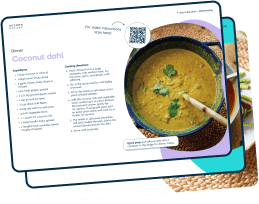Christmas is often a social time of year when we get together with loved ones for large meals, and boxes of Celebrations are passed around.
When you have specific health goals, it can be frustrating to be surrounded by a constant temptation which frequently leads to feelings of food guilt when you ‘give in’.
Food guilt is often related to ‘shoulds’ and strict rules we think we should follow.
For example, we should eat certain foods; we shouldn’t eat chocolate; we should only have 1-2 potatoes, and so on. This can harm our mental health in the long term.
Every time we’re overindulging or breaking a rule, we feel guilty about it. So, what can we do to enjoy a guilt-free holiday season?
Second Nature could provide the proper support if you’re concerned about your relationship with food, your wellness, and why your current lifestyle is leading to weight gain.
On Second Nature, you’re provided with a registered nutritionist or dietitian who can help you develop a sustainable lifestyle suited to your personal goals and preferences.
If you’d like to give Second Nature a go and get set up for the new year and beyond, click here to take our health quiz.
Otherwise, here are our six top tips for avoiding food guilt this festive season.
1) Ditch the ‘shoulds’
‘Should’ sentences about food or drink come from a place of harsh restriction and striving for perfection.
When you catch yourself saying any sentence with a ‘should’ in it, reformulate it to change it from a harsh rule to an attainable goal.
For example:
‘I should drink more water and less fizzy drinks’
This kind of thought results in us feeling restricted. It’s human nature to want to do something more when we feel like it’s off limits!
Stop and reformulate this thought to:
‘Today, I am going to start drinking more water and less fizzy drinks’
Or
‘I want to drink more water and less fizzy drinks’
Setting this as a positive intention means that we are less likely to feel guilty if we experience a slip-up and more likely to feel a sense of achievement if we stick to it.
2) Manage your expectations
There is much more temptation and opportunity to stray from your health goals over the festive period, particularly on Christmas day.
It’s unnecessary to be wholly restrictive and say no to every indulgence. Try thinking ahead and managing your expectations of yourself in advance.
For example, if you have a work Christmas dinner on Friday, and you know it’s a 3-course meal, there is a high chance you will want a dessert that day.
Consider this beforehand, and maybe in the few days leading up to the event, you could swap any sugary snacks (dried fruit, biscuits, chocolate) for healthy alternatives (veggie sticks and hummus, natural plain yoghurt, a handful of unsalted mixed nuts).
Your diet and healthy habits might change and look different over the Christmas period, and that’s OK.
By thinking ahead and managing your expectations, you can prepare for occasional indulgences and then not give in to spontaneous temptation, which often leaves us feeling guilty.
3) Practise mindful eating
When we’re cosying up on the sofa to watch The Holiday or Love Actually, it’s easy to reach for a snack and finish it without much conscious thought.
Mindful eating is essential to help us become more aware of what we’re eating, how much we’re eating, and why we’re eating it. In the long run, this can help us control our portion sizes and stay in tune with what our body actually needs.
Eating our meals and snacks distraction-free is the first step to practising mindful eating.
Try to avoid having a snack in front of the TV, on the phone, or while reading. If you have no distractions in front of you, you can focus on the look, smell, flavour, and texture of your food and enjoy it.
Then, try to slow down your eating. Eating too quickly can be challenging to listen to our internal hunger cues, which tell us when we are full.
4) Avoid the all-or-nothing mindset
If you spontaneously indulge in food or alcohol, try not to let it ruin the rest of your day or week. It’s completely fine to relax and enjoy festive celebrations. It’s important to try to ensure it doesn’t affect the rest of your week.
This kind of thinking is one of the main drivers causing a minor setback, resulting in people feeling guilty and quitting altogether. ‘All-or-nothing’ thinking is when we see things purely in ‘black or white’.
Avoiding this kind of thinking will prevent something psychologists call the ‘what-the-hell effect’. This effect describes the cycle many people fall into once they have indulged slightly, regretted indulging, and then gone back for more because ‘what-the-hell, you’ve already blown it’.
This effect also falls into another phenomenon known as the ‘white bear effect’. When you try to avoid thinking about something or purposefully restrict it, thoughts of that specific thing or food are more accessible.
So by trying to specifically restrict a particular food, you’re more likely to experience cravings and overeating the very foods you were trying to limit in the first place.
Try thinking in shades of grey, which means thinking somewhere in between, for example, ‘I ate too much last night, but the whole week doesn’t have to be perfect. I can eat a healthy breakfast and lunch and make the rest of the day OK’.
5) Detach moral values from food
Try to stop categorising foods as ‘good’, ‘bad’, or ‘treat’, as this encourages the idea that certain foods are off-limits. This restriction not only makes these foods more appealing but can also harbour an unhealthy relationship with food and make us obsess over our food choices.
Instead, foods that you know are less healthy are simply foods to eat in moderate portions, mindfully, and less often. Then, foods we know provide lots of nutritional value for us can be foods we try to eat daily.




